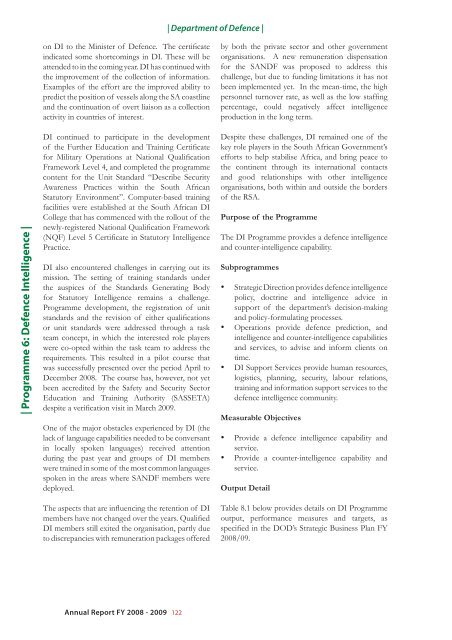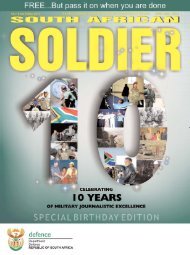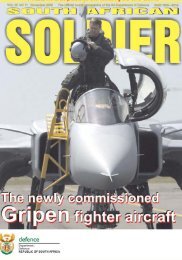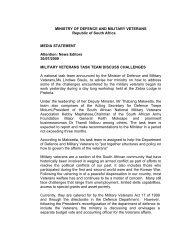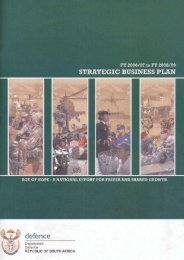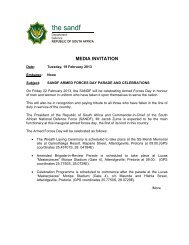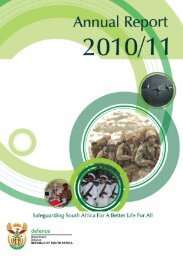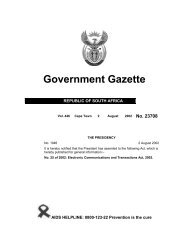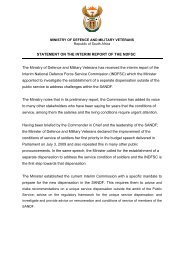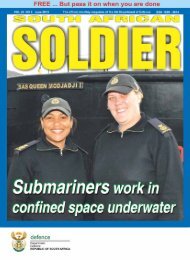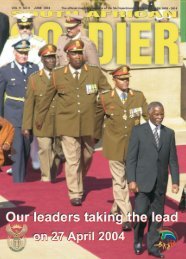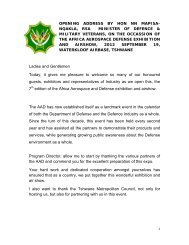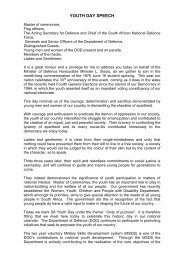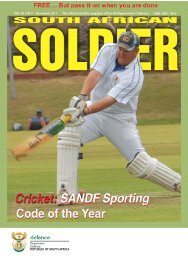Department of Defence Annual Report 2008-2009
Department of Defence Annual Report 2008-2009
Department of Defence Annual Report 2008-2009
- No tags were found...
Create successful ePaper yourself
Turn your PDF publications into a flip-book with our unique Google optimized e-Paper software.
| <strong>Department</strong> <strong>of</strong> <strong>Defence</strong> |<br />
on DI to the Minister <strong>of</strong> <strong>Defence</strong>. The certicate<br />
indicated some shortcomings in DI. These will be<br />
attended to in the coming year. DI has continued with<br />
the improvement <strong>of</strong> the collection <strong>of</strong> information.<br />
Examples <strong>of</strong> the effort are the improved ability to<br />
predict the position <strong>of</strong> vessels along the SA coastline<br />
and the continuation <strong>of</strong> overt liaison as a collection<br />
activity in countries <strong>of</strong> interest.<br />
by both the private sector and other government<br />
organisations. A new remuneration dispensation<br />
for the SANDF was proposed to address this<br />
challenge, but due to funding limitations it has not<br />
been implemented yet. In the mean-time, the high<br />
personnel turnover rate, as well as the low stafng<br />
percentage, could negatively affect intelligence<br />
production in the long term.<br />
| Programme 6: <strong>Defence</strong> Intelligence |<br />
DI continued to participate in the development<br />
<strong>of</strong> the Further Education and Training Certicate<br />
for Military Operations at National Qualication<br />
Framework Level 4, and completed the programme<br />
content for the Unit Standard “Describe Security<br />
Awareness Practices within the South African<br />
Statutory Environment”. Computer-based training<br />
facilities were established at the South African DI<br />
College that has commenced with the rollout <strong>of</strong> the<br />
newly-registered National Qualication Framework<br />
(NQF) Level 5 Certicate in Statutory Intelligence<br />
Practice.<br />
DI also encountered challenges in carrying out its<br />
mission. The setting <strong>of</strong> training standards under<br />
the auspices <strong>of</strong> the Standards Generating Body<br />
for Statutory Intelligence remains a challenge.<br />
Programme development, the registration <strong>of</strong> unit<br />
standards and the revision <strong>of</strong> either qualications<br />
or unit standards were addressed through a task<br />
team concept, in which the interested role players<br />
were co-opted within the task team to address the<br />
requirements. This resulted in a pilot course that<br />
was successfully presented over the period April to<br />
December <strong>2008</strong>. The course has, however, not yet<br />
been accredited by the Safety and Security Sector<br />
Education and Training Authority (SASSETA)<br />
despite a verication visit in March <strong>2009</strong>.<br />
One <strong>of</strong> the major obstacles experienced by DI (the<br />
lack <strong>of</strong> language capabilities needed to be conversant<br />
in locally spoken languages) received attention<br />
during the past year and groups <strong>of</strong> DI members<br />
were trained in some <strong>of</strong> the most common languages<br />
spoken in the areas where SANDF members were<br />
deployed.<br />
Despite these challenges, DI remained one <strong>of</strong> the<br />
key role players in the South African Government’s<br />
efforts to help stabilise Africa, and bring peace to<br />
the continent through its international contacts<br />
and good relationships with other intelligence<br />
organisations, both within and outside the borders<br />
<strong>of</strong> the RSA.<br />
Purpose <strong>of</strong> the Programme<br />
The DI Programme provides a defence intelligence<br />
and counter-intelligence capability.<br />
Subprogrammes<br />
• Strategic Direction provides defence intelligence<br />
policy, doctrine and intelligence advice in<br />
support <strong>of</strong> the department’s decision-making<br />
and policy-formulating processes.<br />
• Operations provide defence prediction, and<br />
intelligence and counter-intelligence capabilities<br />
and services, to advise and inform clients on<br />
time.<br />
• DI Support Services provide human resources,<br />
logistics, planning, security, labour relations,<br />
training and information support services to the<br />
defence intelligence community.<br />
Measurable Objectives<br />
• Provide a defence intelligence capability and<br />
service.<br />
• Provide a counter-intelligence capability and<br />
service.<br />
Output Detail<br />
The aspects that are inuencing the retention <strong>of</strong> DI<br />
members have not changed over the years. Qualied<br />
DI members still exited the organisation, partly due<br />
to discrepancies with remuneration packages <strong>of</strong>fered<br />
Table 8.1 below provides details on DI Programme<br />
output, performance measures and targets, as<br />
specied in the DOD’s Strategic Business Plan FY<br />
<strong>2008</strong>/09.<br />
<strong>Annual</strong> <strong>Report</strong> FY <strong>2008</strong> - <strong>2009</strong> 122


